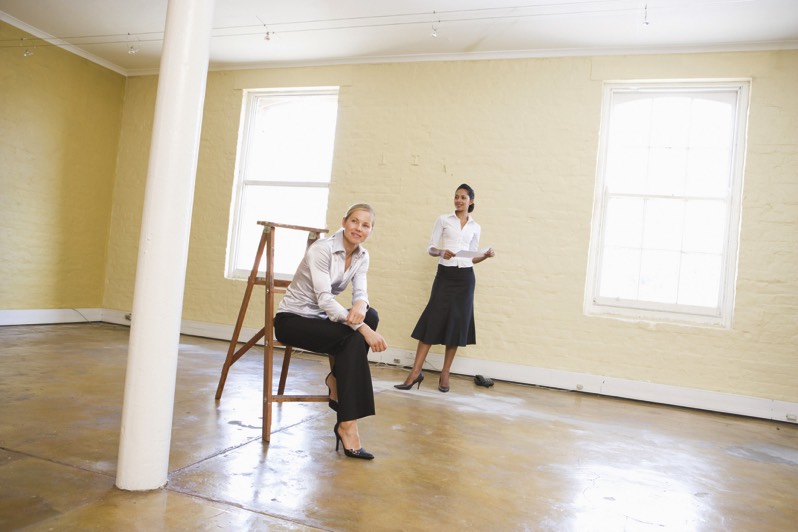LEGAL
Surrey’s Premier Lifestyle Magazine
Taking on new premises: 10 top tips for success
Gemma James, Partner at Mundays LLP, stresses the importance of forward planning when considering the purchase or lease of property for business purposes.

© Monkey Business Images | Dreamstime.com
Have you finally plucked up the courage to take on a first or additional premises for your business? The increasingly positive economists are telling us there is no better time to take the plunge, but it’s always worth looking before you leap! Planning ahead can save you time, stress and money in the future, so maybe take a moment to catch your breath and count to ten…or at least make the ten tips below count amongst your considerations:
1. Do you need a freehold or a leasehold property? A freehold is a major capital investment to fund and commits you to a specific location, but it belongs to you. A lease is for an agreed period of time only, so is useful if you need flexibility, but it places you somewhat at the will of the landlord, liable to pay rent and service charges, and has many terms to negotiate.
2. Involve your accountants at an early stage to address the most tax-efficient structure, not only whether to take a freehold or a lease, but also whether to purchase in the names of individuals or a company. Tax considerations include differences in the amount of stamp duty land tax payable upon completion, capital gains tax allowances (especially if you intend to carry out any works) and inheritance tax. These can have a significant impact on your current and future finances.
3.Use an agent to represent you and guide on the best deals available in the marketplace at the same time as instructing a solicitor to advise and fight your corner once it comes to documenting agreed terms for your purchase.
4. Do you need to alter the premises? Try to have consents in place before you commit from planning and building regulations authorities and (if you are taking on a lease) you may need the landlord’s consent. You might have to remove works at the end of a lease. It’s best to agree vital works from the start to avoid a refusal and/or delay in consent later.
1. Do you need a freehold or a leasehold property? A freehold is a major capital investment to fund and commits you to a specific location, but it belongs to you. A lease is for an agreed period of time only, so is useful if you need flexibility, but it places you somewhat at the will of the landlord, liable to pay rent and service charges, and has many terms to negotiate.
2. Involve your accountants at an early stage to address the most tax-efficient structure, not only whether to take a freehold or a lease, but also whether to purchase in the names of individuals or a company. Tax considerations include differences in the amount of stamp duty land tax payable upon completion, capital gains tax allowances (especially if you intend to carry out any works) and inheritance tax. These can have a significant impact on your current and future finances.
3.Use an agent to represent you and guide on the best deals available in the marketplace at the same time as instructing a solicitor to advise and fight your corner once it comes to documenting agreed terms for your purchase.
4. Do you need to alter the premises? Try to have consents in place before you commit from planning and building regulations authorities and (if you are taking on a lease) you may need the landlord’s consent. You might have to remove works at the end of a lease. It’s best to agree vital works from the start to avoid a refusal and/or delay in consent later.

Gemma is a Partner in the Property Department at Mundays LLP, specialising in all aspects of commercial and residential property. She acts in connection with any commercial property from retail shops, offices and warehouse units to restaurants and bars, for private and corporate landlords and tenants. Gemma also deals with sales, purchases and lettings of residential property and property-related funding arrangements.
Gemma can be contacted by telephone 01932 590645 or by e-mail gemma.james@mundays.co.uk
5. If you are moving from one premises to another or trying to tie up timings to suit your trading requirements, exchanging contracts with the landlord/buyer/seller will give you a binding completion date for exit and entry.
This will enable you to make appropriate arrangements with contractors and suppliers and be as time and cost efficient as possible.
6. If taking a lease, the landlord may ask for a rent deposit or guarantors as security, so ensure you have funds or be prepared to offer a compromise.
7. Look ahead to your exit strategy: if you buy a freehold, how easy will it be to sell? If you take a lease, you may need the landlord’s consent and have to pay its costs before you assign or sub-let. The landlord may impose conditions such as you being the guarantor for the new occupant, so consider the conditions you would accept. A specific clause is necessary if you need the ability to share occupation of your premises with your group companies or customers.
8. In a leasehold arrangement, if you have an option to renew or a break clause, make note of deadlines for serving notice and seek legal advice well in advance to ensure you don’t lose the right.
9. A lease will carry ongoing obligations to the landlord. Try limiting your liabilities, such as not being required to repair the premises to a standard beyond that shown in a photographic schedule of condition. Check if the landlord is planning works which may increase service charges, and try capping your liability for annual service charge.
10. Make financial provisions before the end of the term so that dilapidations obligations won’t come as a shock.
Above all, seek advice from a solicitor, accountant and surveyor at the outset: a little forward planning can save you from long-term disaster!
This will enable you to make appropriate arrangements with contractors and suppliers and be as time and cost efficient as possible.
6. If taking a lease, the landlord may ask for a rent deposit or guarantors as security, so ensure you have funds or be prepared to offer a compromise.
7. Look ahead to your exit strategy: if you buy a freehold, how easy will it be to sell? If you take a lease, you may need the landlord’s consent and have to pay its costs before you assign or sub-let. The landlord may impose conditions such as you being the guarantor for the new occupant, so consider the conditions you would accept. A specific clause is necessary if you need the ability to share occupation of your premises with your group companies or customers.
8. In a leasehold arrangement, if you have an option to renew or a break clause, make note of deadlines for serving notice and seek legal advice well in advance to ensure you don’t lose the right.
9. A lease will carry ongoing obligations to the landlord. Try limiting your liabilities, such as not being required to repair the premises to a standard beyond that shown in a photographic schedule of condition. Check if the landlord is planning works which may increase service charges, and try capping your liability for annual service charge.
10. Make financial provisions before the end of the term so that dilapidations obligations won’t come as a shock.
Above all, seek advice from a solicitor, accountant and surveyor at the outset: a little forward planning can save you from long-term disaster!
The unexpected costs of a new lease
Taking a lease of commercial premises can be an exciting as well as a daunting experience. Nobody likes to focus on the negatives, but in the event that things do not go to plan, it is important to make sure you are adequately prepared.What is my liability under the lease?
A tenant’s liability will usually consist of:
• the annual rent;
• a contribution to the building’s insurance and service charge; and
• any other costs payable by the landlord associated with managing the property.
The service charge, unless capped, can be expensive as it will often incorporate the landlord’s costs in maintaining the exterior of the property, along with any dreaded and unforeseen repair bills.
Your personal exposure will depend on whether you are the tenant in your personal capacity, or as a limited company or partnership. Where the tenant is an unknown entity, the landlord may look to further protect its position by requiring either or both of:
1) A rent deposit
The amount of rent deposit to be given to the landlord will depend on the rent of the lease and it is common for rent deposits to total three, six or twelve months’ rent. The landlord will be entitled to use some or all of the rent deposit to cover any expense suffered as a result of a tenant’s breach of the lease.
2) Personal guarantees
Where a new company is the tenant, the landlord may require a director or other persons to step in as a personal guarantor. This needs to be carefully considered as personal guarantees place a heavy burden on the guarantor, and in the event that the tenant were to break the lease, the guarantor may be required to step in as tenant for the remainder of the term.
Either of these options may be diluted by agreeing that the rent deposit or guarantor will be released if the tenant shows sufficient financial strength during the term of the lease. As a tenant it is important to make sure you take legal advice before committing yourself to liabilities such as these!
James Condie is a solicitor specialising in commercial property. He acts for companies
and private individuals on a broad range of property transactions, with a particular interest in the retail, pharmacy and franchising sectors.
James can be contacted by telephone 01932 590613 or by e-mail james.condie@mundays.co.uk
essence info
Mundays LLPCedar House, 78 Portsmouth Road, Cobham KT11 1AN
Telephone: 01932 590500

